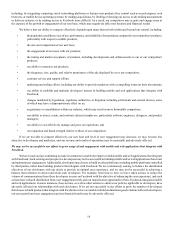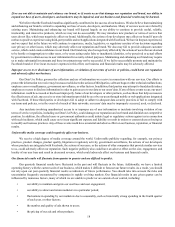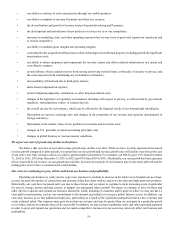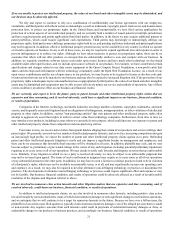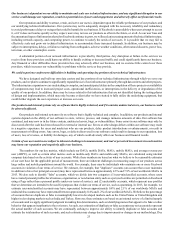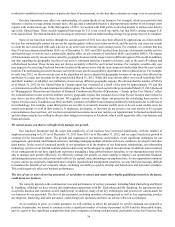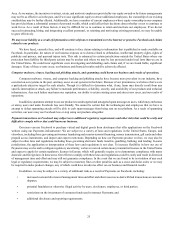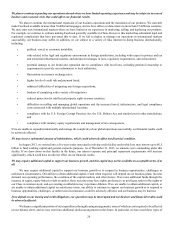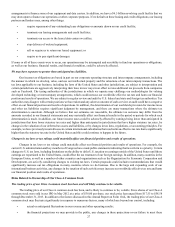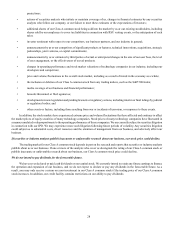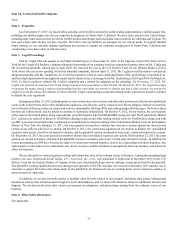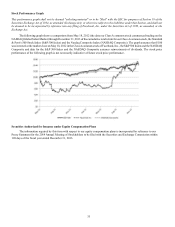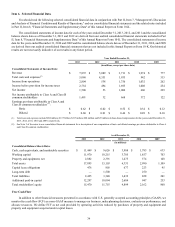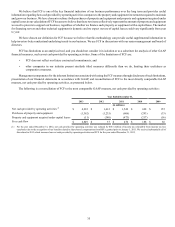Facebook 2013 Annual Report Download - page 27
Download and view the complete annual report
Please find page 27 of the 2013 Facebook annual report below. You can navigate through the pages in the report by either clicking on the pages listed below, or by using the keyword search tool below to find specific information within the annual report.25
Area. As we mature, the incentives to attract, retain, and motivate employees provided by our equity awards or by future arrangements
may not be as effective as in the past, and if we issue significant equity to attract additional employees, the ownership of our existing
stockholders may be further diluted. Additionally, we have a number of current employees whose equity ownership in our company
has provided them a substantial amount of personal wealth, which could affect their decisions about whether or not to continue to
work for us. As a result of these factors, it may be difficult for us to continue to retain and motivate our employees. If we do not
succeed in attracting, hiring, and integrating excellent personnel, or retaining and motivating existing personnel, we may be unable
to grow effectively.
We may incur liability as a result of information retrieved from or transmitted over the Internet or posted to Facebook and claims
related to our products.
We have faced, currently face, and will continue to face claims relating to information that is published or made available on
Facebook. In particular, the nature of our business exposes us to claims related to defamation, intellectual property rights, rights of
publicity and privacy, and personal injury torts. This risk is enhanced in certain jurisdictions outside the United States where our
protection from liability for third-party actions may be unclear and where we may be less protected under local laws than we are in
the United States. We could incur significant costs investigating and defending such claims and, if we are found liable, significant
damages. If any of these events occur, our business and financial results could be adversely affected.
Computer malware, viruses, hacking and phishing attacks, and spamming could harm our business and results of operations.
Computer malware, viruses, and computer hacking and phishing attacks have become more prevalent in our industry, have
occurred on our systems in the past, and may occur on our systems in the future. Because of our prominence, we believe that we are
a particularly attractive target for such attacks. Though it is difficult to determine what, if any, harm may directly result from any
specific interruption or attack, any failure to maintain performance, reliability, security, and availability of our products and technical
infrastructure. Any such failure may harm our reputation, our ability to retain existing users and attract new users, and our results of
operations.
In addition, spammers attempt to use our products to send targeted and untargeted spam messages to users, which may embarrass
or annoy users and make Facebook less user-friendly. We cannot be certain that the technologies and employees that we have to
attempt to defeat spamming attacks will be able to curb spam messages from being sent on our platform. As a result of spamming
activities, our users may use Facebook less or stop using our products altogether.
Payment transactions on Facebook may subject us to additional regulatory requirements and other risks that could be costly and
difficult to comply with or that could harm our business.
Our users can use Facebook to purchase virtual and digital goods from developers that offer applications on the Facebook
website using our Payments infrastructure. We are subject to a variety of laws and regulations in the United States, Europe, and
elsewhere, including those governing anti-money laundering and counter-terrorist financing, money transmission, gift cards and other
prepaid access instruments, and import and export restrictions. Depending on how our Payments product evolves, we may also be
subject to other laws and regulations including those governing electronic funds transfers, gambling, banking, and lending. In some
jurisdictions, the application or interpretation of these laws and regulations is not clear. To increase flexibility in how our use of
Payments may evolve and to mitigate regulatory uncertainty, we have received certain money transmitter licenses in the United States
and expect to apply for certain regulatory licenses in Europe, which will generally require us to demonstrate compliance with many
domestic and foreign laws in these areas. Our efforts to comply with these laws and regulations could be costly and result in diversion
of management time and effort and may still not guarantee compliance. In the event that we are found to be in violation of any such
legal or regulatory requirements, we may be subject to monetary fines or other penalties such as a cease and desist order, or we may
be required to make product changes, any of which could have an adverse effect on our business and financial results.
In addition, we may be subject to a variety of additional risks as a result of Payments on Facebook, including:
• increased costs and diversion of management time and effort and other resources to deal with bad transactions or customer
disputes;
• potential fraudulent or otherwise illegal activity by users, developers, employees, or third parties;
• restrictions on the investment of consumer funds used to transact Payments; and
• additional disclosure and reporting requirements.



